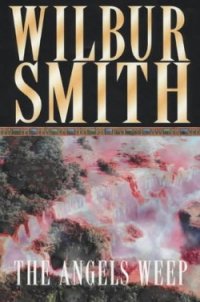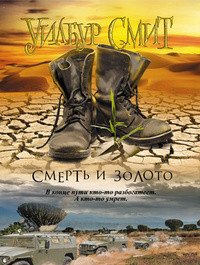The Angels Weep - Smith Wilbur (бесплатные онлайн книги читаем полные версии txt) 📗

Жалоба
Напишите нам, и мы в срочном порядке примем меры.
The Angels Weep - Smith Wilbur (бесплатные онлайн книги читаем полные версии txt) 📗 краткое содержание
The Angels Weep читать онлайн бесплатно
Wilbur Smith - B3 The Angels Weep
PART ONE.
Three horsemen rode out from the edge of the forest with a restrained eagerness that not even weary weeks of constant searching could dull.
They reined in, stirrup to stirrup, and looked down into another shallow valley. Each stalk of the dry winter grass bore a fluffy seed-head of a lovely pale rose colour, and the light breeze stirred them and made them dance, so that the herd of sable antelope in the gut of the valley seemed to float belly-deep in a bank of swirling pink mist.
There was a single herd bull. He stood almost fourteen hands tall at the withers. His satiny back and shoulders were black as a panther's, but his belly and the intricate designs of his face-mask were the startling iridescent white of mother-of-pearl. His great ridged horns, curved like Saladin's scimitar, swept baIck to touch his croup, and his neck was proudly arched as that of a blood Arabian stallion. Long ago hunted to extinction in his former southern ranges, this noblest of all the antelopes of Africa had come to symbolize for Ralph Ballantyne this wild and beautiful new land between the Limpopo and the wide green Zambezi rivers.
The great black bull stared arrogantly at the horsemen on the ridge above him, then snorted and tossed his warlike head. Thick dark mane flying, sharp hooves clattering over the stony ground, he led his chocolate-coloured brood mares at a gallop up and over the far ridge, leaving the watching men mute at their grandeur and their beauty.
Ralph Ballantyne was first to rouse himself and he turned in the saddle towards his father.
"Well, Papa," he asked, "do you recognize any landmarks?" "It was more than thirty years ago," Zouga. Ballantyne murmured, a little frown of concentration puckering an arrowhead in the centre of his forehead, "thirty years, and I was riddled with malaria. "Then he turned to the third rider, the little wizened Hottentot, his companion and servant since those far-off days. "What do you think, Jan Cheroot?"
The Hottentot lifted the battered regimental cap from his head, and smoothed the little peppercorns of pure white wool that covered his scalp. "Perhaps.-" Ralph cut in brusquely, "Perhaps it was all merely a fever dream." The frown on his father's handsome bearded features sharpened, and the scar upon his cheek flushed from boneporcelain to rose, while Jan Cheroot grinned with anticipation, when these two were together it was better entertainment than a cock-fight any day.
"Damn it, boy," Zouga snapped. "Why don't you go back to the wagons and keep the women company." Zouga drew the thin chain. from his fob pocket and dangled it before his son's face. "There it is,"he snapped, "that's the proof." On the ring of the chain hung a small bunch of keys, and other oddments, a gold seal, a St. Christopher, a cigar-cutter and an irregular lump of quartz the size of a ripe grape.
This last was mottled like fine blue marble and starred through its centre with a thick wedge of gleaming native metal.
"Raw red gold, "said Zouga. "Ripe for the picking!" Ralph grinned at his father, but it was an insolent and provocative grin, for he was bored. Weeks of wandering and fruitless searching were not Ralph's style at all.
"I always suspected that you picked that up from a pedlar's stall on the Grand Parade at Cape Town, and that it's only fool's gold anyway." The scar on his father's cheek turned a darker furious red, and Ralph laughed delightedly and clasped Zouga's shoulder.
"Oh, Papa, if I truly believed that, do you think I would waste weeks of my time? What with the railroad building and the dozen other balls I am juggling, would I be here, instead of in Johannesburg or Kimberley?" He shook Zouga's shoulder gently, the smile no longer mocking. "It's here we both know it. We could be standing on the reef at this very moment, or it could be just over the next ridge."
Slowly the heat went out of Zouga's scar, and Ralph went on evenly.
"The trick, of course, is to find it again. We could stumble over it in the next hour, or search another ten years." Watching father and son, Jan Cheroot felt a small prick of disappointment. He had seen them fight once before, but that was long ago. Ralph was now in the full prime of his manhood, almost thirty years of age, accustomed to handling the hundreds of rough men that he employed in his transport company and his construction teams, handling them with tongue and boot and fist. He was big and hard and st rutty as a game cock, but Jan Cheroot suspected that the old dog would still be able to roll the puppy in the dust. The praise name that the Matabele had given Zouga Ballantyne was "Bakela', the Fist, and "he was still fast and lean.
Yes, Jan Cheroot decided regretfully, it would still be worth watching, but perhaps another day, for already the flare of tempers had faded and the two men were again talking quietly and eagerly, leaning from their saddles towards each other. Now they seemed more like brothers, for although the family resemblance was unmistakable, yet Zouga did not seem old enough to be Ralph's father. His skin was too clear and unlined, his eye too quick and vital and the faint lacing of silver in his golden beard might have been merely the bleaching of the fierce African sun.
"If only you had been able to get a sun-sight, the other observations you made were all so accurate," Ralph lamented. "I was able to go directly to every cache of ivory that you left that year."
"By that time the rains had started." Zouga shook his head. "And, by God, how it rained! We hadn't seen the sun for a week, every river was in full spate, so we were marching in circles, trying to find a ford-" He broke off, and lifted the reins in his left hand. "But I've told the tale a hundred times. Let's get on with the search," he suggested quietly, and they trotted down off the ridge into the valley, Zouga stooping from the saddle to examine the ground for chips of broken reef, or swivelling slowly to survey the skyline to try and recognize the shape of the crests or the blue loom of a distant, kopje against the towering African sky, where the silver fair-weather cumulus sailed high and serene.
"The only definite landmark we have to work on is the site of the ruins of Great Zimbabwe," Zouga muttered. "We marched eight days due westwards from the ruins." "Nine days," Jan Cheroot corrected him.




